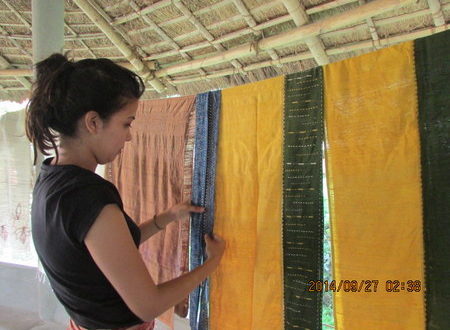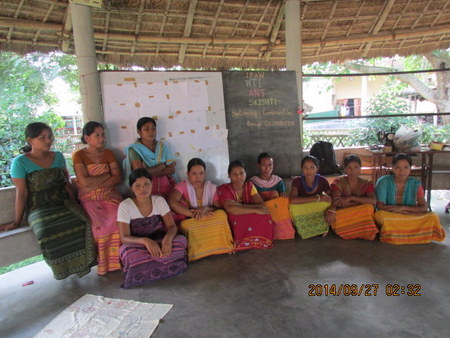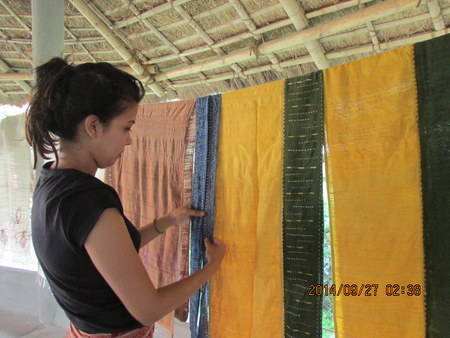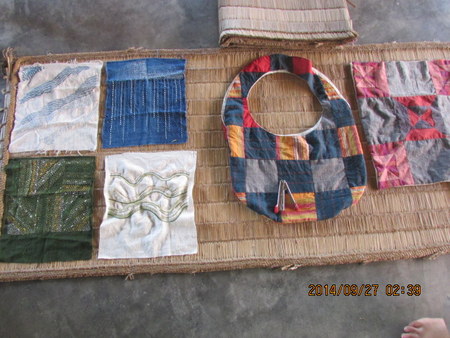Weaving stories and spinning yarns to bring back Manas
Rowmari, Assam, 29 September 2014: The IFAW-WTI initiatives to provide green livelihoods to communities under the Greater Manas Conservation Project went a step further with a three week long training workshop in weaving techniques to professionally prepare the weavers that concluded at Rowmari today.
Through a strategic tie up with the Bengaluru based Srishti Institute of Art, Design and Technology and a fruitful local collaboration with Aagor, the weaving enterprise of the Action Northeast Trust (Ant), the IFAW-WTI team succeeded in enabling eight women beneficiaries sharpen their existing weaving techniques to suit international markets.
The Aagor weavers’ training centre at Rowmari bustled with activity from the 7th September when the group of faculty and trainers arrived from Bengaluru. Eight women weavers, carefully selected from among the IFAW-WTI beneficiaries of the green livelihoods project were brought to the centre for this intensive residential training workshop.
The weavers formerly produced a wide range of hand woven attire comprising traditionally used aronai, gamosa, dokhona in limited colours and patterns that enabled them earn some additional monthly income. Considering the weaving expertise of these women, a unique and innovative idea to merge traditional design with wildlife conservation themes was offered in this workshop.
Swati Unakar, Faculty Coordinator- Textile Design Program of Srishti said, “the women of Assam naturally inherit the art of weaving in their culture. We helped them enhance their skills with new techniques and prepared them to meet the market demand for contemporary designs.”
“They are a happy lot and highly enthused to learning. This is good platform where they can share their experience and explore new ideas”, she added.
This workshop served to inspire them to incorporate the amazing flora and fauna of Assam into their work–leaves, paddy grains, shades of green along with animals they co-exist with. New designs with blending of colors and textures and the art of natural dyeing were introduced to them in an interactive session.
“The learning process in the workshop served to inspire us to include new design and creativity in day to day weaving. It was important to identify our ability to explore new thoughts,” said Monita Warry who never had any formal training in weaving. She started weaving at the age of 18 and inherited the art from her mother.
Maya Mushary, the senior most beneficiary of the group said, “I have been inclined to learn and grab new opportunities. I am excited about this workshop cum interactive session. Now it makes real sense to focus in one direction with some objectives in mind”. Forty-two year old Maya has three children to raise and hails from Kumursali, a village near Manas RF. Apart from her household chores, she is involved in community work and weaving.
Samar Boro, the IFAW-WTI Sociologist, who is in constant contact with the weavers said, “these women are confident weavers and are important decision makers in their families. This enhancing of their skills and introducing new ideas is opening more avenues. They have already succeeded in incorporating the design of the Asian Elephant in aronai (traditional scarf), which was a new and challenging task for them. This workshop will refine their products to another level.”
Samples created during this workshop were shared in an open house exhibition, where the women displayed two sets of Boro sarees with a fusion of local design and modern colors, table linen, cushions, naturally dyed garments and various ranges of travel accessories.
IFAW-WTI had initially provided the weavers with looms and yarn. More than 55 handlooms were provided to the prospective 60 identified beneficiary women of this region ( 8 in Polodobi forest village, 10 in Nabin Nagar, 11 in Sisubari forest village, 21 in Rangijora and 6 in Sourang).
“We hope these women will go back to their village and train more beneficiaries in turn”, said Rupa Gandhi, Chief of WTI’s Social Entrepreneurship division, Nature India, that aims to help find market linkages for the unique products that are in the pipeline. “The rich cultural heritage of Bodo weaving showcased through products will heighten awareness on the pride of Assam globally and help conservation efforts that provide a green livelihood to communities locally,” she added.
Yet another step in bringing back Manas – this time, by bringing Manas into homes.













